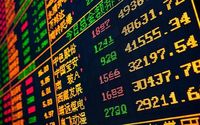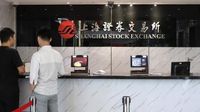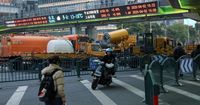The Shanghai Composite index of the Shanghai Stock Exchange experienced a dramatic drop of 7.34% on Monday, April 7, 2025, closing at 3,096.58 points. This decline marked the index's worst performance in five years, reflecting heightened investor anxiety amid escalating trade tensions between the United States and China. Simultaneously, the Shenzhen Component index plummeted by 9.66%, closing at 9,364.50 points, while the ChiNext Index, China’s growth enterprise board, fell by 12.50% to end at 1,807.21 points.
This market turmoil was largely triggered by fears of a global trade war, following the U.S. government's recent imposition of a 34% tariff on Chinese goods. In response, China announced its own retaliatory tariffs of equal measure, intensifying concerns among investors about the potential for a prolonged economic conflict. Panic selling ensued, with many investors opting to liquidate their holdings in light of the uncertain economic landscape.
The repercussions of these developments were felt across Asian markets, with Hong Kong's Hang Seng index suffering a staggering 13.22% drop, closing at 19,828.30 points. This was the largest single-day decline for the index in recent memory, as financial and technology stocks bore the brunt of the sell-off. Analysts noted that the dramatic downturn was not only a reflection of the immediate impact of tariffs but also of broader worries regarding global economic stability.
In an effort to stabilize the market, China's Central Huijin Investment, a state-backed sovereign wealth fund, intervened by increasing its holdings in China-listed shares through exchange-traded funds. In a statement, the fund expressed its commitment to "safeguard the smooth operation of the capital market," emphasizing its optimism about the long-term prospects of China's economy. This intervention came after the Shanghai index had already lost 7.6% since the announcement of the U.S. tariffs, a decline that was notably less severe than the 13% drop experienced by Japan's Nikkei index during the same period.
Huijin's actions were seen as a crucial step in preventing further declines, as they helped to restore some confidence among investors, who had been rattled by the rapid market fluctuations. Trading volumes for several ETFs favored by Huijin surged to their highest levels in a year, indicating a renewed interest in these investment vehicles amidst the chaos.
Wen Hao, a stock trader at Yingzhiliang Hangzhou Technology, remarked that while the market had limited room to fall due to state support, the ongoing trade tensions posed significant risks. "Hunting for bargains now is like catching a falling knife," he cautioned, suggesting that many investors might prefer to hold cash until the market stabilizes further.
The dramatic downturn in the stock market has prompted discussions among analysts and economists about the broader implications for China's economy. As the world's second-largest economy, any significant slowdown could have ripple effects globally. The trade war's potential to disrupt supply chains and consumer confidence raises concerns about a possible recession, not just in China but across the globe.
In addition to the immediate stock market impacts, the situation has sparked a debate about the future of U.S.-China relations. Chinese officials have characterized the U.S. tariffs as "economic bullying" that contradicts international trade norms. They have called for a resolution through dialogue that respects both nations' interests. However, the aggressive stance taken by both sides has left many wondering if a compromise is possible.
As investors navigate this turbulent period, the outlook remains uncertain. Some analysts believe that the Chinese government may need to implement further measures, such as monetary easing or incentives to boost consumer spending, to mitigate the economic fallout from the trade conflict. Others, however, argue that such measures may not be sufficient to counteract the effects of a trade war that could escalate further.
Amidst these challenges, the Chinese government has reiterated its commitment to fostering a stable investment environment. The Central Huijin Investment's intervention is part of a broader strategy to reassure investors and maintain confidence in the Chinese stock market. As the situation evolves, market participants will be closely monitoring developments in U.S.-China relations and their implications for global trade and economic growth.
Overall, the events of April 7, 2025, serve as a stark reminder of the interconnectedness of global markets and the potential for geopolitical tensions to impact financial stability. As the world watches, the outcome of this trade dispute will likely shape economic trajectories for years to come.







